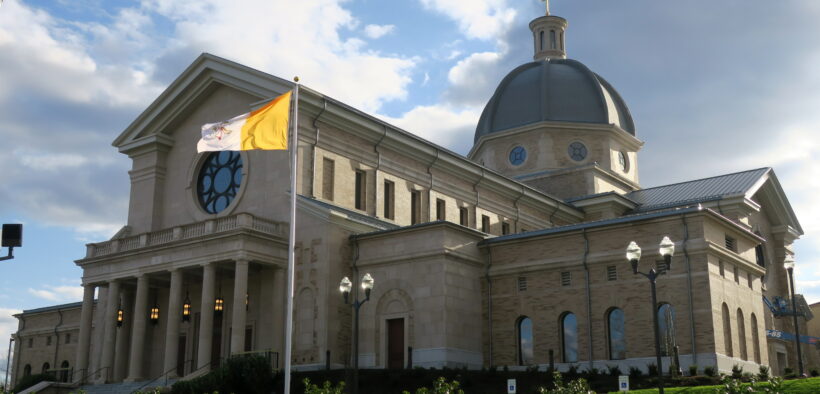Knoxville Diocese Forces Victim to Reveal Legal Name to Continue Lawsuit

Recently, the Catholic Diocese of Knoxville won a legal push to force an alleged rape victim to use his legal name instead of a pseudonym protecting his identity before continuing a lawsuit he filed against the church.

Most Sacred Heart of Jesus Cathedral, the Mother Church of the Catholic Diocese of Knoxville / Photo by Nheyob / Wikipedia
On February 22, 2022, a former diocesan musician and employee filed a lawsuit against the Catholic Diocese of Knoxville and its bishop, Richard Stika, for six counts of negligence, infliction of emotional distress, and defamation involving an incident with a seminarian. He filed the complaint under the pseudonym John Doe.
In the complaint, Doe accused seminarian Wojtek Kamil Sobczuk of raping him at Doe’s home on February 5, 2019. Sobszuk apologized to Doe for “what was wrong” in a written apology but continued to harass him sexually at work.
The suit—filed three years after the rape, said the defendants neglected to investigate Doe’s report fully and spread false and defamatory rumors about him to protect Sobczuk and their reputation.
Doe’s attorneys said the pseudonym was necessary because the case involved sexual abuse. They said that forcing Doe to name himself would harm his recovery from the trauma of the alleged assault. In addition, Doe would face reasonable fear of “embarrassment, stigma, humiliation, and economic harm” if he revealed his identity.
On February 25, 2019, Doe contacted the Knoxville Police Department to report the incident with Sobczuk, court documents said. The officer Doe spoke with told him that if Doe filed a report, the church would “come after Doe, Doe would lose his job, and it would be a he-said/she-said situation.”
Access to MinistryWatch content is free. However, we hope you will support our work with your prayers and financial gifts. To make a donation, click here.
“Discouraged and fearful of the church—and unable to cope economically with the consequences of losing his job—Doe did not file a report,” the complaint said.
However, the diocese’s lawyers argued that Doe had not given an acceptable reason to continue under a pseudonym and said his case was already public.
According to Casetext Research, a legal research tool, some courts are reluctant to allow a plaintiff to proceed pseudonymously based solely on allegations of sexual harassment. For a plaintiff to proceed anonymously, courts often require additional grounds, such as a reasonable fear of reputational damage or risk of psychological harm if the litigant’s true identity is revealed.
“A relevant factor in determining whether plaintiffs can proceed under a pseudonym is whether their identity has thus far been kept confidential. If a plaintiff publicly identifies themselves in the media or whose name was publicly released in an underlying criminal proceeding may be precluded from using a pseudonym,” Casetext states.
In his ruling, Judge E. Jerome Melson agreed with the diocese because Doe was an adult when the alleged rape happened and due to the “presumptively open and public nature of judicial proceedings in Tennessee.”
According to Knox News, the ruling shocked sex abuse advocates. Several advocates called the maneuver an intention to intimidate Doe and scare off anyone contemplating reporting a sexual assault in the future.
Claiming that the diocese was trying to intimidate and “revictimize” the victim, Mitchell Garabedian, world-renowned clergy sex abuse attorney who assisted in breaking open the Catholic Church sex abuse scandal in Boston in the early 2000s said the diocese was acting in a heartless manner “which indicates a complete lack of understanding of the evils of clergy sex abuse and the damages caused by clergy sex abuse.”
“It’s a pretty rare but very mean-spirited move. It’s even more rare that a judge sides with a defendant over an alleged (sex abuse) victim in this way,” David Clohessy, former executive director of Survivors Network of those Abused by Priests (SNAP), wrote to Knox News in an email.
For more information on the investigations, Knox News has aggregated detailed coverage of the story as it develops.
Doe’s case is one of two open cases against the Catholic Diocese of Knoxville. A widowed mother of three using the pseudonym Jane Doe is suing the diocese, Father Antony Punnackal, and Carmelites of Mary Immaculate for $5 million in damages, alleging they sought to intimidate and discredit her after reporting Punnackal sexually harassed her at a grief counseling meeting in 2020.
John Doe’s attorney, Patrick Thronson, said Doe will be refiling soon.



